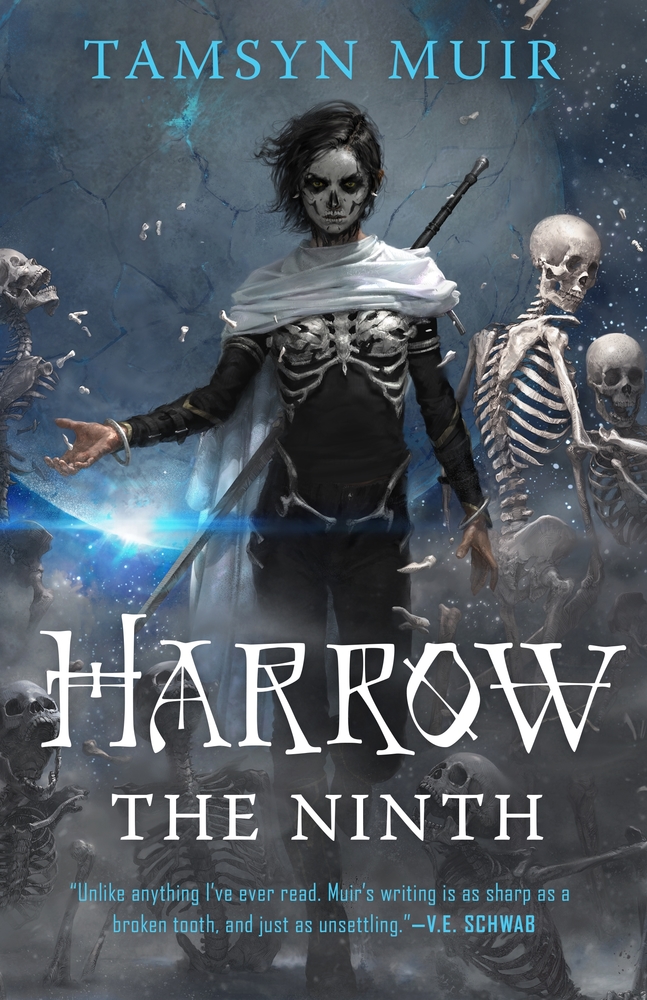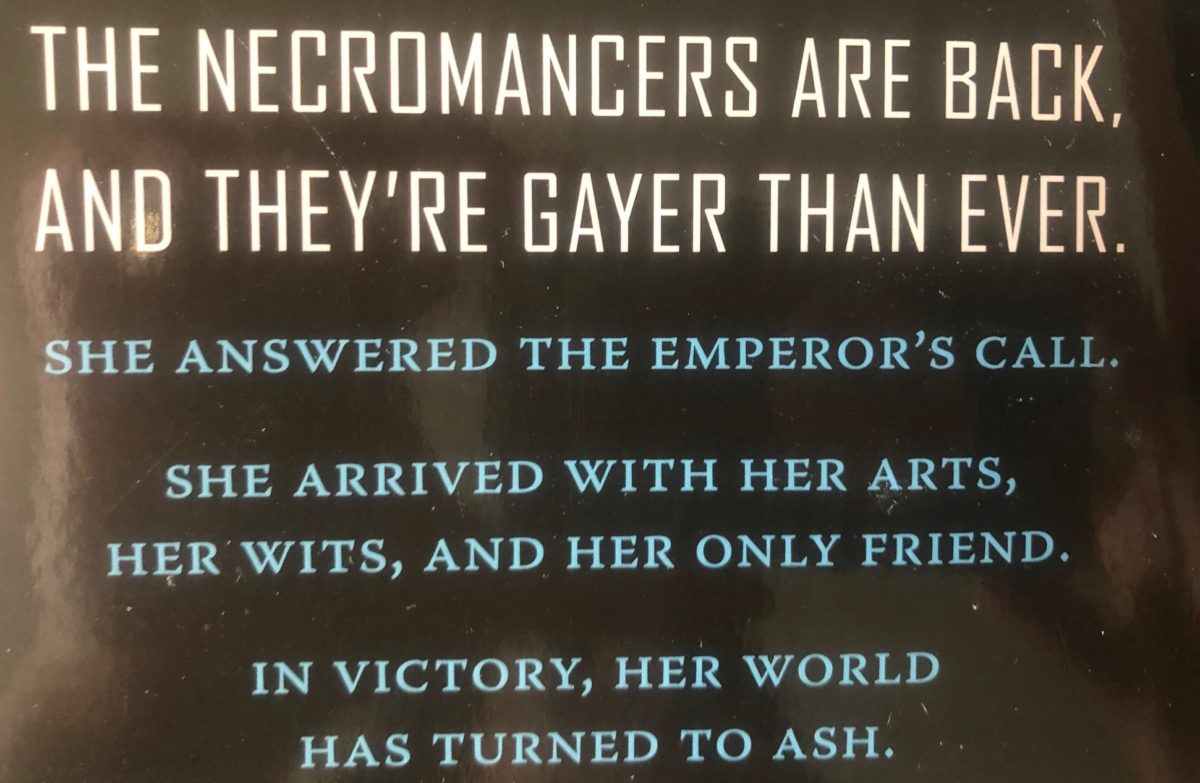Rejoice! For the necromancers are back, and they are gayer than ever. Pansexual, polyamorous lusts and even a few chaste passions simmer beneath more layers of mystery and necromantic magic than ever before, and dear grim little Harrow is our guide. Which is both fortunate and challenging, because she’s going places you wouldn’t believe.
No matter what you expected, this will not be the book you thought it would be. And that’s both its flaw and its glory. It is, more than any other book I’ve read this year, absolutely the book it is, without apology or explanation. It is not trying to woo you or explain things to you. It is not asking for your permission. And it is not trying to recreate Gideon the Ninth.

Except, it sort of does.
We awake with Harrow from a strange memory of her past into the madness of her Lyctorhood. She is now her own source of near-limitless power, second only to God—who takes her as his pupil. Harrow was the last, most desperate effort of her House to restore itself, and she succeeded wildly. And it means nothing, now. Far bigger, more terrible things are coming for her now, most of them immanent. But some of them are buried in her past at Canaan House, and the chapters alternate between her confused present and the past we think we knew from Gideon the Ninth. But Harrow’s perspective isn’t just slightly different: she recollects an entirely different story. This isn’t an author reiterating their successful work. It’s actually the opposite: Muir is casting doubt after doubt on the Gideon narrative, rewriting its most basic facts. Which puzzles did Harrow actually solve? What power did she ever have? Was our beloved Gideon Nav even there at all?
Gideon the Ninth dropped us into the world of the Locked Tomb with an affable jock as our guide: her understanding of necromancy was only slightly better than ours. But now it’s Harrow’s turn, and Harrow is a genius. That’s bad enough, but Harrow is also a damaged genius. She’s reeling from the unrelenting trauma of her upbringing, her experiences in Canaan House, and her ascent to Lyctorhood. And on top of that, she sees and hears things that aren’t there.
Or does she?
It’s tremendously disorienting to have such a thoroughly unreliable narrator. And that’s compelling, sure, but not in a wholly good way. Harrow the Ninth reminds me a lot of The Rook, but the thing about The Rook was that protagonist Myfanwy knew there was a mystery. She knew there was something missing. Harrow doesn’t. And without the protagonist to guide our understanding, the first part of the book feels a little like looking for clues in a clue factory. Everything might be relevant.
You basically have to have read Gideon the Ninth rather recently, or remember it pretty well, in order to be certain which aspects of Harrow’s narrative are out of joint. I thought I was in the latter camp, but I struggled to be sure of what I did or did not know. If Muir wanted to create a sense of dissociation, she nailed it. Muir is not holding your hand. This is clearly the book she wanted to write, and hooray for that, but it doesn’t mean it’s an easy book to read for the first 100 pages or so.
I give Muir a lot of credit for that. She’s not trying to reproduce the success of Gideon. She’s telling Harrow’s story in Harrow’s way, which is to say, in a twisty, secretive, paranoid way that might be genius or might be insane. (It’s both.)
Fortunately, the prose, the larger story, and the overall moxie carry through the confusion, and once you get into the meat of the story, the pieces slowly start to come together. And then it pretty much doesn’t matter that you’re confused, because you, like Harrow, have bigger things to worry about. Giant planet-eating undead monstrosities? Check. Smaller, just-as-dangerous undead monstrosities that might be stalking a sparsely populated space station? Also check.
The dry, understated, self-deprecating British humor and the slightly manic British humor are two buoying currents running through the narrative. Harrow the Ninth is disarmingly hilarious, and the moments of levity enhance rather than undercut the dreadful seriousness of everything Harrow has to deal with. Which are, in no particular order, being haunted, being murdered, being an incomplete Lyctor, being threatened with the total annihilation of her way of life, and being in love.

The humor also does a lot to make sure the story doesn’t get bogged down in gore, since this is one of the most gleefully gross books I’ve ever read. The Saw franchise wishes it could get half as weird and visceral as this, but Muir doesn’t even pause to revel in her lurid imagination. Because Harrow, like Gideon, is not really horror. It’s too accurate, for one thing: Muir throws around adjectives like cicatricial* quite freely, and all her characters have the clinical perspective of surgeons rather than the gibbering anxiety of normal folks when confronted with bodies doing what they are really really not supposed to do.
It’s also too action oriented to be horror, and there are too many other things going on to spend time dwelling on how creeped out you might be. There’s plenty of suspense, but there’s also political intrigue, murder mystery, magical theory-crafting, and spaaaaaace. It’s a genre-bending, -blending, and -breaking amalgam of only the most awesome elements from each. Which is extremely cool, and makes for a bonkers third act, but also does add to the confusion in the beginning as well, since all of it takes some setting up.
You absolutely must stick with it. Because the payoff is worth the effort, and more. It’s a balls-to-the-wall knock-down drag-out fight to the finish that tugs every heartstring, both metaphorically and literally. It’s like John Wick and Silence of the Lambs had a baby. It’s like The Girl with the Dragon Tattoo hooked up with She-Ra in space. It’s like—
It’s like Tamsyn Muir. And really, she’s like no one and nothing else. So place your trust in the author who makes God a secondary character, and keep following her down into the dark. You will be amazed at what she has made with it.
Harrow the Ninth comes out August 4th.
*It means “a scar resulting from formation and contraction of fibrous tissue in a wound.” It is so obscure that Google thought it was not English. If I may borrow another of Muir’s linguistic peccadillos: I am horny with admiration.
